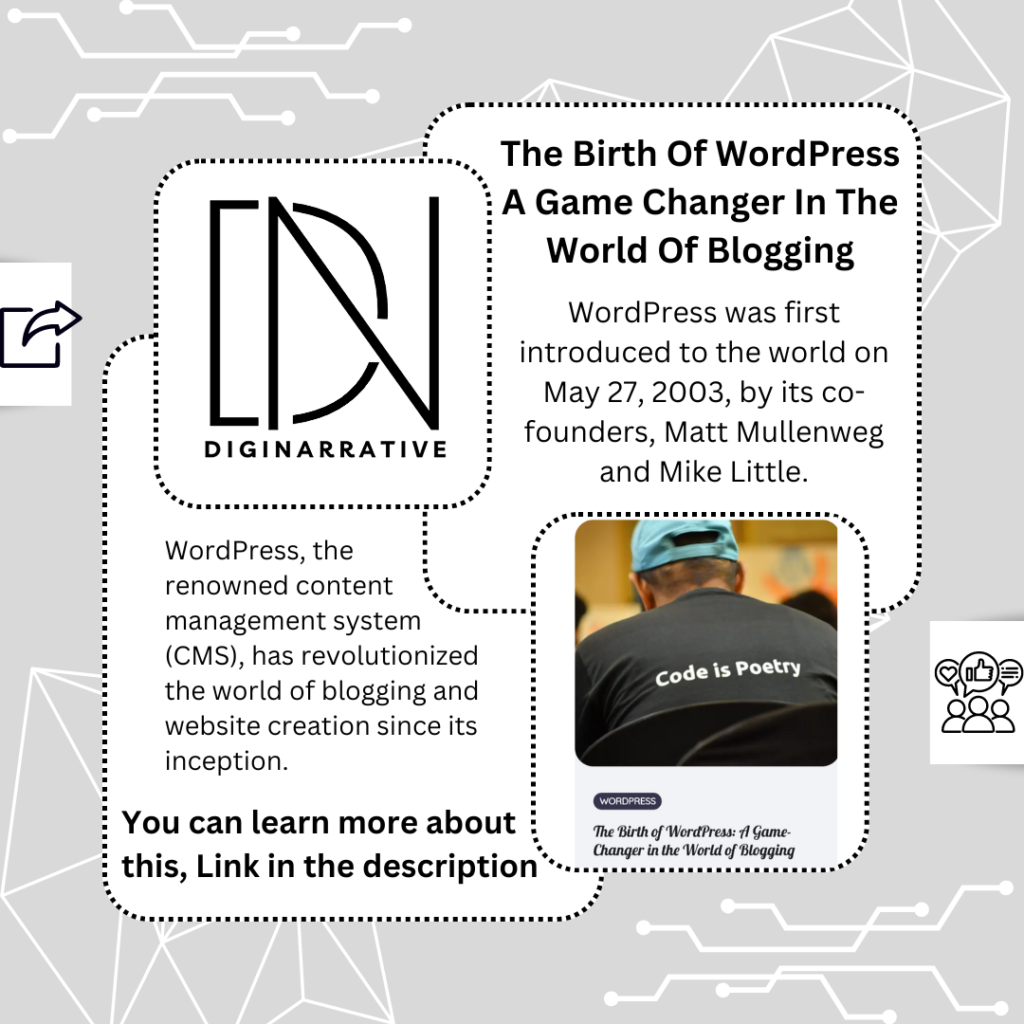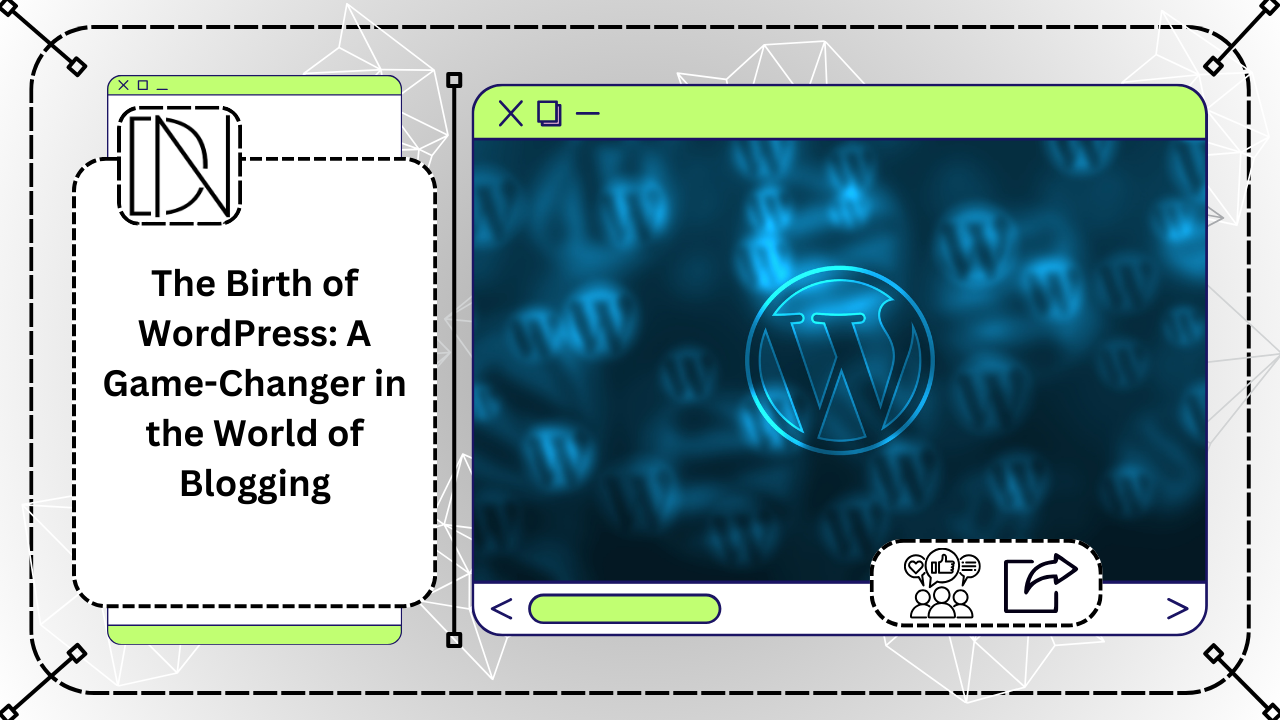
WordPress, the renowned content management system (CMS), has revolutionized the world of blogging and website creation since its inception. It has empowered millions of individuals and businesses to establish their online presence with ease and efficiency. But have you ever wondered when WordPress was founded and how it came into existence? Let’s take a journey back in time to explore the birth of this game-changing platform.
The Origins of WordPress
The Humble Beginnings
WordPress, now one of the most widely used content management systems (CMS) around the world, has its roots tracing back to a small project initiated in 2003. It all began when Matt Mullenweg and Mike Little developed a fork of an earlier project called b2/cafelog. Their vision was to create an elegant, well-architected personal publishing system built on PHP and MySQL.
Rapid Growth and Development
By the end of 2003, WordPress had started gaining traction. Its open-source nature allowed developers from around the globe to contribute, improving its functionality and expanding its capabilities. The introduction of essential features like the plugin architecture and themes made WordPress not just a blogging tool, but a flexible CMS suitable for a wide range of applications.
Milestones That Shaped WordPress
Several significant milestones have marked the journey of WordPress since its inception. The release of version 1.2 in 2004 introduced plugins, which have become a cornerstone of WordPress’s adaptability. By 2005, WordPress 1.5 presented themes and static pages, paving the way for users to create not just posts, but entire websites easily.
Another landmark came in 2008 when the WordPress team unveiled the revamped administration interface, enhancing user experience and accessibility. The growth trajectory continued with each version bringing more sophisticated tools for users and developers alike.
WordPress Today
Fast forward to today, and WordPress powers over 40% of websites on the internet. From personal blogs to major corporate websites, the adaptability and robust architecture of WordPress have made it an indispensable tool in web development.
The origins of WordPress reflect a journey of innovation, community collaboration, and continuous growth. Its humble beginnings have evolved into a platform that empowers millions to share their voices and create digital experiences across the globe.
The Rise of WordPress
WordPress quickly gained popularity among bloggers due to its simplicity, flexibility, and extensive range of features. As an open-source platform, it allowed users to customize and extend its functionality to suit their specific needs. This flexibility, combined with a vibrant community of developers and users, contributed to WordPress’s rapid growth.
Introduction to WordPress
WordPress has become a cornerstone of modern website creation. With its user-friendly interface and versatile capabilities, it is no wonder that WordPress powers more than 40% of all websites on the internet. This blog post aims to provide a comprehensive overview of the rise of WordPress and its impact on digital content creation.
The Evolution of WordPress
Initially launched in 2003 as a blogging platform, WordPress has evolved significantly over the years. It began as a tool primarily for bloggers, but it quickly expanded to include a variety of features such as themes, plugins, and widgets. This evolution has transformed WordPress from a simple blogging tool to a full-fledged Content Management System (CMS) that can handle everything from small personal blogs to large corporate websites.
Factors Behind WordPress’s Popularity
Several key factors have contributed to the rise of WordPress. Chief among them is its open-source nature, which encourages continuous improvement and innovation by the global developer community. Additionally, its flexibility and customizability allow users to create highly personalized websites. The extensive library of plugins and themes available also means that there is almost no limit to what a WordPress site can do.
The Impact of WordPress on Web Development
WordPress has democratized web development, enabling individuals and businesses to create their own websites without needing extensive technical knowledge. This accessibility has leveled the playing field, allowing smaller entities to compete with larger, more resource-rich organizations. Furthermore, the platform’s ongoing development and updates ensure that it stays current with technological trends and security standards.
Conclusion
The rise of WordPress is a testament to its robustness, flexibility, and community-driven development model. As it continues to evolve, WordPress is likely to remain a dominant force in the world of web development. Whether you are a seasoned developer or a novice looking to create your first website, WordPress offers the tools and resources to turn your vision into reality.
One of the significant milestones in WordPress’s journey was the release of version 1.5 in February 2005. This update introduced themes, allowing users to change the appearance of their websites without altering the underlying code. It was a game-changer, as it made website design accessible to individuals without technical expertise.
Another pivotal moment came in 2010 with the release of WordPress 3.0, which integrated WordPress MU (Multi-User) into the core software. This merger enabled users to manage multiple websites from a single installation, making it an attractive solution for businesses and organizations.
The WordPress Community
One of the key factors behind WordPress’s success is its vibrant and supportive community. From developers to designers, bloggers to business owners, the WordPress community is a diverse group of individuals who contribute their expertise and collaborate to improve the platform.
The community’s dedication is evident in the numerous Word Camps held worldwide, where WordPress enthusiasts gather to share knowledge, network, and learn from each other. These events foster a sense of camaraderie and further strengthen the WordPress ecosystem.
A Hub of Innovation
The WordPress community is an expansive network of developers, designers, and users who are dedicated to enhancing the platform. This community plays a critical role in the evolution and growth of WordPress, ensuring that it remains a top choice for website creation worldwide.
Contributions That Make a Difference
From creating plugins to designing themes, the contributions from the WordPress community are vast and varied. These contributions help make WordPress as versatile and powerful as it is today. Community members regularly collaborate through forums, meetups, and online groups, sharing their expertise and innovations.
Supporting Each Other
What truly sets the WordPress community apart is the spirit of support and cooperation. Whether you are a beginner or an advanced user, there are plenty of resources available, from detailed documentation to helpful tutorials. The community is always eager to assist, providing advice and solutions to any challenges you might encounter.
The Present and Future of WordPress
Today, WordPress powers over 40% of all websites on the internet, a testament to its dominance in the CMS market. Its user-friendly interface, extensive plugin library, and robust ecosystem continue to attract new users and keep existing ones loyal.
Looking ahead, the future of WordPress appears bright. The development team continues to innovate and improve the platform, ensuring it remains at the forefront of technology. With the introduction of the Gutenberg block editor in WordPress 5.0, website customization has become even more intuitive and visually appealing.
Furthermore, WordPress’s commitment to accessibility, security, and mobile responsiveness ensures that it remains a reliable and accessible platform for users of all backgrounds.
The Evolution of WordPress
WordPress has come a long way from its humble beginnings in 2003 as a simple blogging platform. Today, it powers around 40% of the web, making it the most popular content management system (CMS) globally. With its user-friendly interface, extensive plugin ecosystem, and relentless focus on flexibility, WordPress has become the go-to solution for not only blogs but also complex websites and e-commerce portals.
Current Trends in WordPress Development
Presently, WordPress is embracing the concept of block-based editing through its Gutenberg editor. This modern tool aims to enhance site-building by offering a more visual approach to design and content creation. Additionally, the focus on mobile responsiveness, security enhancements, and integration capabilities with other platforms has solidified its relevance in the evolving online landscape.
The Future Potential of WordPress
Looking ahead, the future of WordPress appears promising with numerous exciting developments. The continuous updates to the Gutenberg editor indicate a shift towards an even more intuitive user experience. Moreover, the introduction of Full Site Editing (FSE) promises to revolutionize how users customize their websites, bringing more holistic control over their site’s layout and design directly within the block editor.
Other future advancements may include deeper integration with artificial intelligence, improving on-site personalization and expanding its e-commerce capabilities. The growing focus on the headless CMS approach, isolating the backend from the frontend, might further enhance WordPress’s adaptability and performance across various devices and platforms.
In conclusion, WordPress remains a robust and versatile platform, continuously evolving to meet the needs of its expanding and diverse user base. With ongoing innovations and improvements, it is well-positioned to retain its dominance in the CMS market for years to come.
In Conclusion
WordPress has come a long way since its founding in 2003. From a humble blogging platform to a versatile CMS, it has transformed the way we create and manage websites. Its success can be attributed to its user-friendly nature, extensive customization options, and a passionate community.
So, the next time you use WordPress to build your website or start a blog, take a moment to appreciate the journey it has taken to become the powerhouse it is today.





